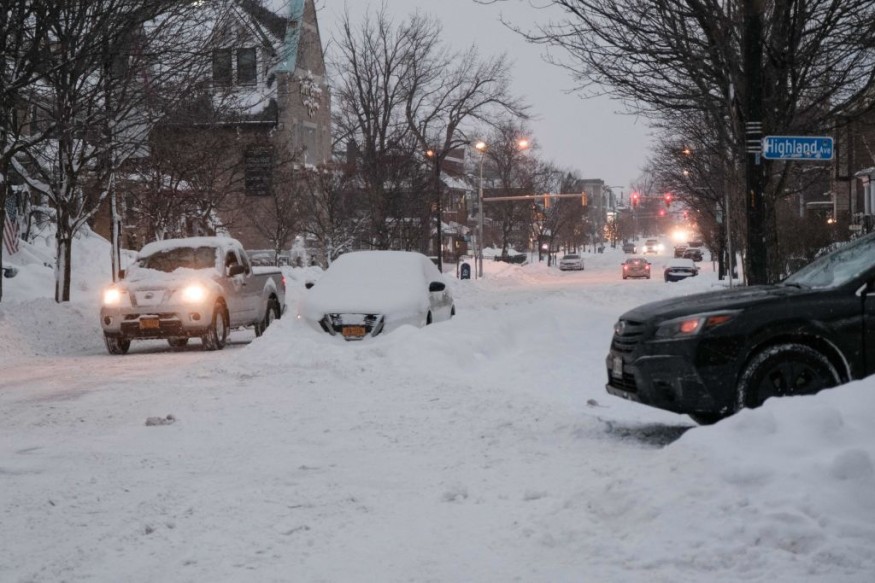
The area has reached 95 inches of combined snowfall as a result of the 2 chaotic winter storms that hit Buffalo. 28 people have died as of the latest death toll update in one of the worst weather-related disasters to ever affect western New York.
There have been at least another 20 deaths reported across the rest of the United States as a result of the fierce winter storm.
The National Weather Service predicted that through Tuesday, up to 9 more inches of snow might fall in some parts of western New York.
Around Buffalo, bodies of the deceased were discovered in cars, homes, and snowbanks Some people died while shoveling snow, while others died as a result of emergency personnel's delayed response to medical emergencies.
Doula Melissa Carrick claimed that the blizzard made it necessary for her to guide a pregnant client through labor over the phone. None of the nearby hospitals could be reached, so an ambulance crew took the woman to a hospital 45 minutes south of Buffalo.
Climate Change Crisis
According to scientists, the storm's intensity may have been influenced by the crisis surrounding climate change. According to Mark Serreze, the National Snow and Ice Data Center director at the University of Colorado, Boulder, this is because the atmosphere can hold more water vapor, which serves as fuel.
On Friday and Saturday, the blizzard rampaged across western New York. People in the Buffalo area begged for food and diaper donations on social media because many grocery stores were shut and driving was prohibited.
The county official, Poloncarz, described it as looking at a white wall for about 14 to 18 hours straight.
According to forecasts, temperatures will gradually rise later this week, providing some relief, according to Ashton Robinson Cook of the National Weather Service.
The bomb cyclone, which occurs when atmospheric pressure falls dramatically during a powerful storm, has weakened, according to Cook. As it developed close to the Great Lakes, it sparked blizzard-like conditions with strong winds and snowfall.
Canceled Flights
As of Monday at around 3 PM EDT, 3,410 flights-both domestic and international-had been canceled, according to flight tracking website FlightAware. Southwest Airlines, according to the website, had 2,497 cancellations, which is roughly 60% of its scheduled flights and more than ten times as many as any other significant US carrier.
Southwest claimed that as the weather improved, the situation would stabilize and get better.
According to FlightAware data, airports across the US, including Denver, Las Vegas, Atlanta, Seattle, Baltimore, and Chicago, were experiencing cancellations and delays.
95 Inches Snowfall
Kathy Hochul, governor of New York, visited Buffalo, her hometown, on Monday and described the blizzard as "one for the ages." On Saturday, she claimed that almost all of the city's fire trucks became stranded.
Hochul pointed out that the storm arrived just over a month after the area experienced another "historic" snowfall. The two storms' combined snowfall is close to the average annual snowfall of the area, which is 95.4 inches.
At 10 AM on Monday, the National Weather Service reported that the snow accumulation at Buffalo Niagara International Airport was 49.2 inches. The Officials stated that the airport will be closed until Wednesday morning, according to AP News.
Winter Storm Crises
According to Shahida Muhammad, the ventilator for her 1-year-old son lost power due to an outage. She and the child's father gave the child manual breathing treatments from Friday until Sunday when rescuers responded to her frantic social media posts. Despite the ordeal, she claimed that her son was doing well and was a "fighter," WKBW reports.
As a result of the storm, power was lost in towns from Maine to Seattle.
Practically the entire country was reported to have experienced storm-related fatalities, including at least eight fatal crashes in Kansas, Missouri, and Kentucky. In Wisconsin, a woman fell through the river ice, and in Kansas, a homeless camp caught fire and killed one person.
According to authorities, crews in Jackson, Mississippi, struggled on Monday to somehow get water through the city's troubled water system. Residents were advised to boil their drinking water on Christmas Day because water lines had frozen and burst, according to ABC 7.
© 2025 NatureWorldNews.com All rights reserved. Do not reproduce without permission.





